WINTER 1998 Montanan - Volume 15, Number 2
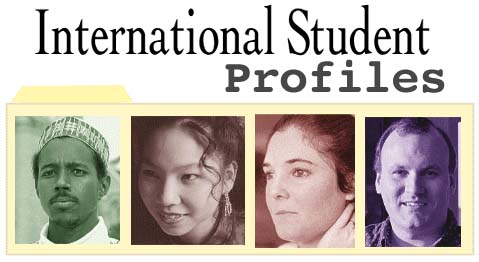
by Sharon Barrett, Suzanna Sonnenberg and Paddy Macdonald
Out of Africa
Moussa Sow
by Susanna Sonnenberg
Moussa Sow is from Senegal, a land made so remote by its distance of six thousand miles from Missoula that most people here have never heard of it. Even the post office clerk, when presented with a letter addressed to West Africa, asks him, "Where?"
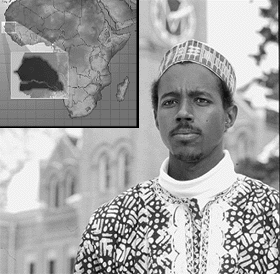
The tall, twenty-seven year old Fulani Tribe member is used to living away from his home, having left Ndippane, a remote northern village of 150, to go to high school in a nearby town. "The Fulani are a nomadic people," he says. "And usually can't send their children to school." But Moussa's father is a shopkeeper and trader, rather than the typical itinerant farmer, which enabled him to send his eldest son off for an education.
The Fulani people, who dominate Senegal's northern upcountry, number nearly 200,000 and live in several West African countries. Farming cattle and harvesting millet and groundnuts (such as peanuts), they move across great spans of territory and pride themselves on self-sufficiency. Moussa comes from a small Muslim village that was founded by his grandfather and great-grandfather many years ago.
Moussa first heard of UM from two Senegalese professors who taught African literature at UM. Chosen from Senegal's University of Saint-Louis to study at UM, Moussa wanted a graduate program where, on top of studying French literature, he could experience "total linguistic immersion." The amiable graduate student was welcomed by faculty and students. "What was amazing, and still is, is the warmth of the people, both on and off campus," Moussa says. "I've been helped with everything. My fellow students even bought me a winter jacket!"
After five months, Moussa feels comfortable in Montana. But at first-aside from the Missoula Farmers' Market, which reminded him of the Sunday market where the Fulani sell their sheep and buy rice-Moussa said the differences between Montana and Senegal were shocking. "I was terribly homesick," he says. "My phone bill was very expensive." Closely tied to his family, he likes to keep track of his five brothers and sisters.
Moussa, who has encountered neither racism nor discrimination in Montana, was surprised by how different Americans were from what he had anticipated. "I expected to find people who are cold and who don't care about me, and that's not the case," he says. "Also, time is respected here. In Senegal, people spend a lot of time talking, while here people work hard and never miss a rendezvous."
If Moussa had mistaken impressions of the United States, Americans can be just as confused about Africa. "Apparently, people do not have a clue about what is going on in Senegal," he reports. "People ask, 'Do you have naked people living in the bush? Are you living with animals? Do you have savage people?' It shows the importance of the cultural exchange, because by being here I am able to explain that life is not like this at all in Senegal. People are wearing clothes. People have electricity, televisions, CNN. We know what is going on in the world. It is not that primitive at all."
Before returning to Senegal, Moussa will spend one year at UM. The "outspokenness, knowledge and humility" of his American teachers has impressed him. What else will he miss once he's back home in the small country in northwest Africa? He answers quickly. "The Internet tools!" Then he becomes thoughtful. "In Senegal you can see the hierarchy of the society by looking at people. Whatever the social status of the individual here, you can't see it through his or her behavior. The richest person can go to a garage sale. These are the things I will miss." M
Susanna Sonnenberg is a free-lance writer who makes her home in Missoula. She regularly contributes to the Missoulian and the Montanan.
The Meaning of Big
Mancia Ko
by Sharon Barrett
Mancia Ko grew up in Hong Kong speaking Cantonese, the language of her family, and English, but it wasn't until she arrived at The University of Montana that she discovered a new meaning for the English word "big."
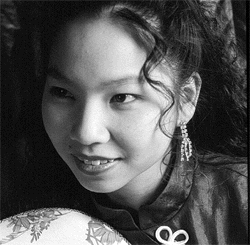
The brochure that had convinced Mancia to study pharmacy at UM described Missoula as one of Montana's biggest cities. Mancia's idea of big was shaped by her homeland-six and a half million people on an island of thirty-one square miles. Flying into Missoula, she wondered, "Did I get on the wrong plane or something? Where are the skyscrapers? Where are the financial buildings?"
That was three-and-a-half years ago. Since then she's become used to Missoula's "nice environment, simple lifestyle" and the "beautiful" campus, which she says "feels like about a tenth of the size" of the Hong Kong university where she spent her first year. Even without skyscrapers, "life here is wonderful," she says.
Mancia was the top student in chemistry at her Catholic high school, and she is an outgoing person who likes people. "Pharmacy was one area where I could combine both interests," she says. She also credits her grandfather with her pursuit of pharmacology. "He treated people with Chinese herbs in Hong Kong. I think I have his gene." She notes that herbal remedies are still popular in Hong Kong. "If we have a cold or the flu, we use western medicine," she says. But many people also use a "very concentrated" herbal tea "if the western medicine doesn't work."
Contrary to the stereotype of Chinese families, Mancia and her younger sister, a college student in Hong Kong, did not grow up in an extended family. "Satellite families"-two parents and one child or two-"are common in Hong Kong," says Mancia. "It's an expensive place to live."
Mancia's vivaciousness has held her in good stead at UM. She's president of the 400-member International Student Association, co-manager of UM's International House and a contributor to the international student newsletter. In a recent issue, Mancia gave her fellow international students tips for cultural adjustment. "Tolerate what you see and hear on television, movies, radio, CDs and on videos," she wrote. "You are not obligated to agree, neither do you have to transform to be accepted by society. However, try not to be judgmental. The more reactive you are, the more likely you are to retreat inside yourselves."
Mancia tries to be tolerant of the prejudice she sometimes encounters against herself and her international classmates. It doesn't happen often, she says, but sometimes "in a restaurant, we'll be a long time getting served." When people are negative toward a racial or ethnic difference, "you always know it," she says.
Such occasions are far outweighed by the supportiveness of University faculty and staff and by the wonderful friendships she's formed in Montana. And, if things do get a little too small, there's always Las Vegas. "It's awesome," she says. "All of a sudden, getting out of Missoula and going to a city with all the neon lights felt like home."
Like many Hong Kong natives, Mancia has ties to both the East and the West. Thinking of the East, she says she and her family are optimistic about Hong Kong's reversion from British to Chinese rule. "Although there are lots of uncertainties," she says, the change takes the Chinese people of Hong Kong "back to our roots."
Thinking of the West, she cites her name-"Mancia," an Anglicized version of her Chinese name, "Manshui." "My father made it up, thinking it would be an easier remembered name" for English speakers. She's used it in her English world since elementary school.
In Chinese, her name means "outstanding." Given Mancia's accomplishments, it appears that, in English, the meaning has not changed. M
Sharon Barrett is a UM journalism professor.
Andes to Rockies
Yudit Buitrago
by Sharon Barrett
Fluent in English, Italian and her native Spanish, with a reading knowledge of French, and experienced in living or traveling in the United States, Canada, Europe and South America, Yudit Buitrago broadens the meaning of international.
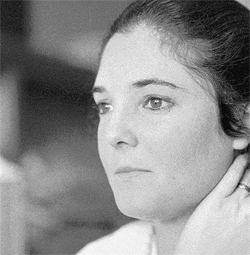
And it may be a toss up as to who got the most out of this Argentine student's two-and-a-half years at The University of Montana. Yudit (the Y is pronounced like the g in melange) left in December with a master's degree in communication studies. She also compiled a record of having taught thirteen sections of public speaking. At the end of her last semester, she calculated that she'd listened to 1,042 student speeches.
Deciding to study for a graduate degree at UM was not difficult. She wanted a flexible program, and UM's communication studies department fit the bill. Plus, the department was welcoming. Letters she received from another school came addressed, "Dear Prospective Student." UM's began, "Dear Yudit."
Finding the campus was another story. "I actually couldn't even find Missoula on a map," Yudit says. "I found Helena." Her travel agent also had trouble. "She didn't know where to send me."
She arrived in Missoula on August 25, 1995, from the midst of Argentina's winter. She remembers thinking, as she landed at the airport, "My god, I'm in the middle of the country and there's nothing here. I'm in the middle of a farm."
Even so, she says, "I didn't have culture shock, not like a lot of foreign students have." Previous experience living abroad helped prepare her for the change. From ages six to ten, she lived in Minnesota, where her father, a chemical engineer, earned a doctorate from the University of Minnesota. At nineteen Yudit moved to Denver, where her father took a year-long sabbatical from his teaching post in Santa Fe, Argentina, and Yudit attended Denver Business College. The following year, her father's work took the family to Italy.
Despite the lack of culture shock, Yudit faced adjustments in Montana. One was the campus. Although she thought it was lovely, it was about four times smaller than the Cordoba campus where she got her undergraduate degree three weeks earlier in social communications-a field that encompasses journalism, public relations and advertising.
Then there was the food. "The Argentine diet is based on meat," she says. "But meat is very expensive here, especially for a student budget." And there were spices she was used to that she couldn't find in Missoula. Restaurant items had too much sauce, too many dressings.
In general, "this is a country of so many options," she says. "You always have to choose."
With the influence of roommates who were vegetarians and the availability of ethnic foods-such as Thai, Indian and Chinese-her tastes changed. But not so much that she abandoned her love of carne asada-a form of grilled steak that is a national dish in Argentina-that her father promised to provide as a welcome-home meal when Yudit returned in December.
After visiting with her parents and three younger brothers, this recent UM graduate-who served as vice president of the 400-member International Student Association-plans to look for a job with a multinational corporation in Buenos Aires.
Yudit also plans to promote UM among friends, family and colleagues in Argentina. "I think it's a great place," she says. "We (foreign students) come here, leaving behind our families, everything we know, and people here are warm and ready to help. I never had a single bad moment here."
Well, maybe, she admits, a couple of those 1,042 speeches could have been better. M
Heimat to Home
Udo Fluck
by Paddy MacDonald
Es gibt nur einen Udo. For the Germanically challenged, it means "There is only one Udo." Udo Fluck, that is, an education doctoral student from Naurod, a suburb of Wiesbaden, Germany.
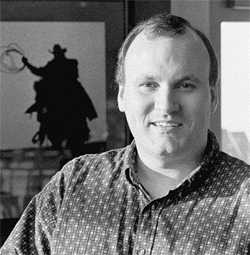
He arrives for his interview natty in a necktie and sportcoat, lugging the ever-present nylon briefcase that is, according to Udo, empty. "It's just for looks," he explains, unzipping the bag and displaying its gaping insides. "This briefcase makes me look busy." Asked if he'd like coffee, Udo pauses. "Would you be able to whip up a Denver omelette?"
Udo, the only child of an engineer and Naurod's mayoral secretary, had always dreamed of going to school in America. And after a visit to his uncle's ranch between Belt and Monarch, where he learned to "ride a horse and shoot a Winchester," and tours of The University of Montana and Montana State University, Udo decided to attend UM because of its state-of-the-art radio-television department. "I worked in television in Germany," Udo says. "I shot everything from crawling bugs to family gatherings."
Udo's adjustment to Missoula was relatively easy. He arrived in early September 1989. "By October I was dreaming in English," he says. "That's when I knew I was at peace. 'Home' is where you feel comfortable and safe. I took my former life and implanted it here." Udo's true culture shock occurred the first time he returned to Germany, where the stores close at 6:30 p.m. "It aggravated the daylights out of me," he says. "I'd say to the storekeepers, 'I know a place where stores stay open all night, where they actually want to please you so you'll come back.'"
After graduating in December 1993 in radio-television, Udo earned his master's degree in interdisciplinary studies. He then enrolled in the School of Education's doctoral program, where his interest lies in distance-learning projects. "Through telecommunications, students can learn about Fabergé eggs from Moscow University and whales from UC-Berkeley. A New Yorker can take a forestry class at UM," Udo says. "I want to discover how distance-learning programs can be improved and be more effective in the multicultural environment of the future and, at the same time, keep the human aspect of learning."
Sharing cultural traditions and promoting diversity are Udo's passions. As a three-time president of the International Student Association, he organized the International Festival and Food Bazaar, which attracted more than 3,000 visitors last year. "Diversity is addictive," he says. "There's no surgeon's warning on that, either."
Cutting a wide swath through the community, Udo has been seen marching in campus ceremonies with other foreign students, a German flag flapping over his shoulder. Or waving from the ISA float in the Homecoming parade, decked out in Germanic glory. "We foreign students are proud of our customs, and we don't want to turn them in," he says. "You give up a little bit of your past when you do that."
A month after Udo's arrival in the United States, the wall came down in Germany, and he received several invitations to lecture in the high schools. "As a German, I was in demand," he explains. "I was able to see the changes that unification brought about from two different angles: Watching CNN, seeing Tom Brokaw walking on the wall gave me a perspective from the outside in. I also spoke to German friends and read the German newspapers to view the situation from the inside out."
Examining a situation from a different angle, evaluating it and learning from it is Udo's approach to life as well as education. "I'm learning to appreciate and embrace American traditions and combine them with the values and the special things about my homeland," Udo says. "We foreign students develop split personalities, for better or worse."
Paddy MacDonald, M.A. '81, is a free-lance writer in Missoula.
M